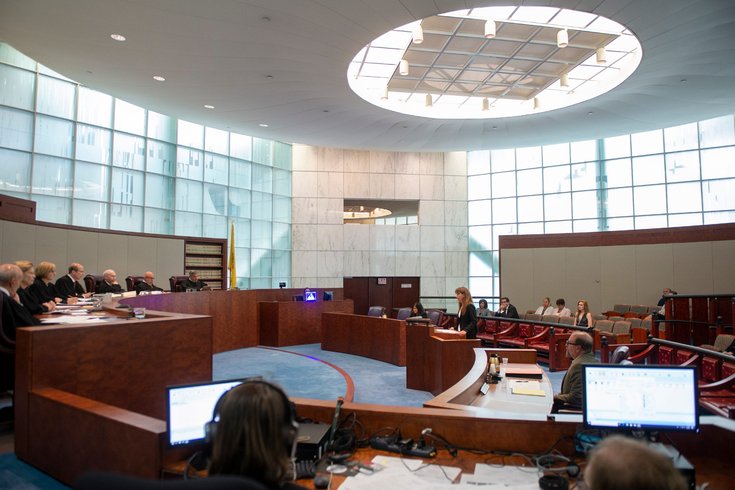
January 16, 2024
 Joe Lamberti/Courier Post; USA Today Network
Joe Lamberti/Courier Post; USA Today Network
The New Jersey Supreme Court drafted a new test for prosecutors who want to charge someone with making terroristic threats. This is a file photo from 2019 showing the inside of the New Jersey Supreme Court.
The New Jersey Supreme Court on Tuesday drafted a new test for prosecutors who want to charge someone with making terroristic threats in a ruling that ordered a new trial for a Freehold man who argued he was exercising his First Amendment right when he told police to “worry about a head shot.”
The court, in a unanimous, 35-page ruling, said prosecutors must prove that a person in a position similar to a victim’s would have viewed a message as threatening to sustain a prosecution. A charge that fails that test is likely unconstitutional, the court wrote.
RELATED: New Jersey's proposal to limit children’s social media use has a big obstacle: the First Amendment
“This is another way of saying that context matters,” the ruling says. “Considering the perspective of one similarly situated to the victim, which entails consideration of prior interactions between the parties, protects against convictions for statements made in jest, political dissent, or angry hyperbole, while allowing the State to prosecute true threats of violence that would instill fear of injury in a reasonable person in the victim’s position.”
The new test adds to an existing requirement, set by U.S. Supreme Court precedent, that the person making a threat have some understanding of their statements’ threatening nature.
The defendant in the case in question is Calvin Fair, who was charged with making terroristic threats after telling officers to “worry about a head shot” while they were responding to a domestic disturbance call at his Freehold home in May 2015.
In a Facebook post made hours after the encounter, Fair said he knew where the officers lived and what cars they drove. In a separate post made a month earlier, he said handguns police seized from his home in a February raid were not his, adding he still had all of his firearms.
Prosecutors argued the social media posts lent legitimacy to the threat Fair made at the scene, while Fair’s attorneys charged he was engaging in constitutionally protected political speech, claiming the encounter at his home was a heated debate with an officer and his Facebook posts were a criminal justice critique.
The justices said that while the U.S. and New Jersey constitutions protect speech critical of the law, government, or government officials, Fair was not prosecuted for that kind of speech.
“He was prosecuted for threatening to shoot a police officer in the head,” Justice Rachel Wainer Apter wrote for a unanimous court.
The justices ordered a new trial for Fair with orders the jury be instructed to determine which section of the state’s terroristic threat statute he violated.
The first section criminalizes threats of violence made to terrorize, force evacuations, or other public inconveniences. The second section criminalizes a threat to kill made to intimidate or terrorize a victim.
New Jersey Monitor is part of States Newsroom, a network of news bureaus supported by grants and a coalition of donors as a 501c(3) public charity. New Jersey Monitor maintains editorial independence. Contact Editor Terrence McDonald for questions: info@newjerseymonitor.com. Follow New Jersey Monitor on Facebook and Twitter.